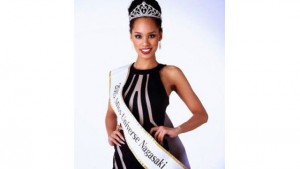
Ariana Miyamoto, daughter of a Japanese mother and African-American father, recently became the first multiracial contestant to be crowned Miss Universe Japan, according to news reports.
Apparently Black is also beautiful in Japan, despite the nation’s reputation for a lack of diversity.
Ariana Miyamoto, daughter of a Japanese mother and African-American father, recently became the first multiracial contestant to be crowned Miss Universe Japan, according to news reports. The former Miss Nagasaki will represent Japan in the 2015 Miss Universe pageant.
Local media describe the 20-year-old as a “saishoku kenbi,” a woman blessed with both intelligence and beauty. She holds a fifth-degree mastery of Japanese calligraphy, according to JapanToday.com.
But there have been mixed reactions to a “h-fu,” the Japanese word used to refer to half-Japanese individuals, representing the country.
“The selection of Ariana Miyamoto as this year’s Miss Universe Japan is a huge step forward in expanding the definition of what it means to be Japanese,” Megumi Nishikura, filmmaker and co-director of the film “Hafu: The Mixed-Race Experience in Japan,” told NBC News. “The controversy that has erupted over her selection is a great opportunity for us Japanese to examine how far we have come from our self-perpetuated myth of homogeneity while at the same time it shows us how much further we have to go.”
The Japanese Ministry of Health, Labor and Welfare has reported that one in 49 babies born in Japan today are born into families with one non-Japanese parent, according to “Hafu.”
While the nation remains a center of global tourism and trade, it remains skeptical of diversity and actually prides itself on its homogeneity — more than 98 percent of the population comprise Japanese nationals, according to Vox.com. As such, it has a long and complicated history of racism.
For example, the Vox article cited Japanese entertainers’ donning of “blackface,” theatrical makeup traditionally used in entertainment to perpetuate negative stereotypes about African Americans.
“The blackface thing is emblematic of a larger problem of Japanese politics and civil society in which diversity is not recognized, or cultivated, or respected,” said Kyle Cleveland, an associate professor of sociology at Temple University’s Tokyo campus who lectures on race.
For example, artists who wear “blackface” and other appropriations, say they are signs of their appreciation for other cultures, but rather, they are signs of cultural ignorance and insensitivity that can be addressed through education, Cleveland said.
“Japan is a globalized society,” he said, but sometimes, it’s “very tone deaf.” —(AP)
